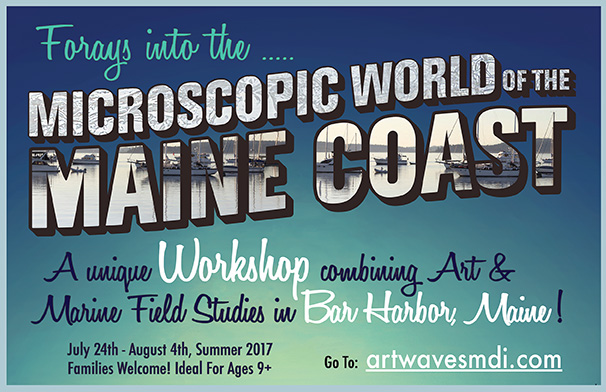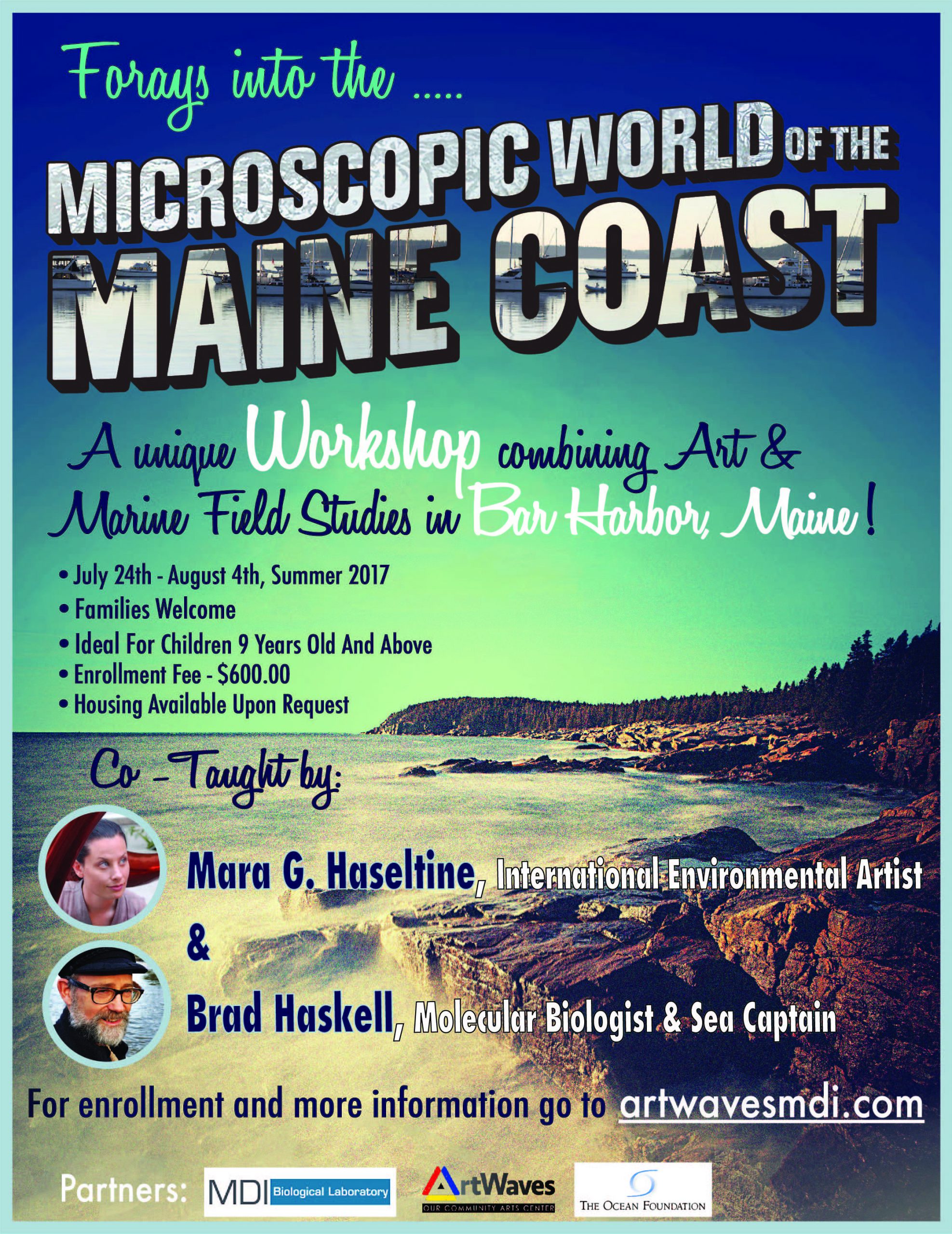

TWO WEEK SUMMER WORKSHOP: July24th-August 4th, Summer 2017 in Scenic Bar Harbor Maine!
Forays into THE MICROSCOPIC WORLD OF THE MAINE COAST- combining art and Marine Field Science.
When: July24th-August 4th, Summer 2017
Cost: $600.00 enrolment fee
(Housing available Upon Request)
To reserve your spot got to: artwavesmdi.com
I am are happy to announce the launching of this new workshop this unique two week intensive merges marine field science and art located in Bar Harbor, Maine on Mt. Desert Island. The workshop is designed for all ages and ideal for anyone nine years old through adults perfect for an entire family! The Workshop will be co-taught by International Environmental Artist Mara G. Haseltine and Molecular Biologist and Sea Captain Bradford Haskell. This workshop is a partnership between ArtWaves of Bar Harbor Maine, MDI Biological Laboratories on Mt Desert Island and The Ocean Foundation.
To learn more and enroll and read teacher’s Bios go to: www.artwavesmdi.com
Partners Websites:
ArtWaves: www.artwavesmdi.com
MDI Biological Labs: https://mdibl.org
The Ocean Foundation: www.oceanfdn.org
Mara G. Haseltine: www.calamara.com
Overview of Workshop:
This workshop is open to all ages and perfect for entire families to enjoy the Maine Coastline and learning together. (We ask that students nine under nine years old be accompanied by an adult.) Bar Island will act as field study ecosystem and is conveniently located within walking distance from ArtWaves in Downtown Bar Harbor, Maine, where most of the classes will take place. Bar Harbor located on Mt. Desert Island, home of the famous Acadia National Park, is one of the most stunningly beautiful and frequented naturalist vacation spots in America.
The students in this dynamic Workshop will interact, understand, and connect to the natural world along the Maine Coastline in a way few people get to see it through the lens of a microscope. This multi- disciplinary two-week workshop takes students through the steps of specimen and data collection in the field, specimen preparation, visualizing the specimens under the microscope, categorizing their specimens and creating artwork based on their findings. Field trips will be augmented by lectures on Maine Marine Coastal Ecosystem Biology, one day of Lab work at the prestigious MDI Labs , studio art classes as well as lectures on Environmental Art and practices around the world. This workshop’s strength is its hands approach marine field science, lab work and multimedia art which teaches students of all ages how to use primary source biological material as their inspiration for art-making. The Workshop will culminate in a final exhibition that portrays a contemporary portrait of the Maine Coastline on a microscopic scale in Summer 2017 open to the general public at ArtWaves in downtown Bar Harbor. Truly an adventure not to be missed!
A detailed Syllabus with an optional reading list will be available two weeks before this workshop commences.
Teaching Goals:
The primary teaching goal of this workshop is to teach students of all ages how to use primary source biological material in the microscopic realm, which exists all around us. The Maine Coast in the summer is an abundant resource for this kind of study and with its massive eleven-foot tides it is an ideal place to collect samples and learn about coastal ecosystems and how they operate and also how they are impacted even on a microscopic scale from anthropogenic sources.
The study of the ocean on all levels is crucial. The oceans are more fragile now than ever in recent history due to anthropogenic causes, the ecological balance in nature is threatened – students will inevitability experience these delicate interactions in the field. Ultimately this workshop teaches students in depth knowledge through experiential learning. Concepts of broader spectrum on how the world functions on a minute level what environmental stressors exist on both a macro and minute scale are exemplified by observing the current state health of the Maine Coastline. The Class will be Co-Taught by International Environmental Artist

Above Image of the three stages of the Workshop in a 3 day version taught at St. Joseph’s College Oct 2015
Teacher’s Bio’s below:
Bio: Mara G. Haseltine
Mara G. Haseltine is an internationally renowned artist known for her sculptural renditions of microscopic life forms. She was an early pioneer in the translation of bioinformatics into three-dimensional forms. She is an ardent environmentalist and co-founder of The Green Salon, an international think tank devoted to environmental solutions. In 2007, Haseltine created New York City’s first solar-powered oyster reef. She has since devoted her attention to exploring the most efficient and beautiful designs to create oyster and coral reefs. These reefs filter water, create habitats for other organisms, and form reef breaks along coast lines. In 2011, Haseltine was an artist-in-residence at University College of Dublin in Ireland and Tara Oceans. She was awarded Flag 75 from the Explorer’s Club for her three-year voyage around the world studying the ocean’s relationship to climate change. Her current body of work combines microscopy and reef design of microscopic oceanic life forms. Haseltine frequently collaborates with scientists, technologists and engineers to practice Geotherapy–art which heals the planet. She was an artist-in-residence for Imagine Science Films for the years 2012-2013.
Haseltine received her undergraduate degree in Studio Art and Art History from Oberlin College and her master’s degree from the San Francisco Art Institute with a double degree in New Genres and Sculpture. She has exhibited and worked throughout the United States, Canada, Europe, Asia, and at the National Museum of Trinidad and Tobago in the Port of Spain, Trinidad. She has taught at The New School in NYC, and she is a member of both the Sculptors Guild of NYC as well as the Explorer’s Club. She works out of New York City and Orland Maine. Her work has been published in The Times, Le Monde, The Guardian, and Architectural Record etc.…
BIO: Bradford Haskell
Bradford Haskell is a biologist that spent many years aboard marine research vessels and international commercial fishery enterprises with National Marine Fisheries Service. His collaborations with institutions include habitat restoration designed with students as environmental stewards. Citizen science is a rapidly growing philosophy that proves young learners have fun while contributing to our collective body of knowledge. As a contributor to Frenchman Atlas, Brad has co-authored (with students) maps using Global Information Systems (GIS). * Over ten-year experience as a college educator provides unique background in field studies. Experiential learning methods taught by College of the Atlantic (COA) teaching certification program, garner a multi-faceted interest by students. Employing COA training in field studies in vernal pools mapping by The Jackson Laboratory (JAX) students contributed to our regions protection of natural resources. Brad moved up to Mount Desert Island to work as a researcher at JAX studying molecular biology techniques after receiving his advanced degree at University of Southern Maine. He has written scientifically peer reviewed articles and enjoys teaching the next generation of young professional at Eastern Maine Community College(EMCC) as an adjunct instructor, while also employed as a business manager at Design Group Collaborative (DGC) – an architectural firm specializing in laboratory built environment. He loves to sail in Maine’s down east archipelago in the summer and fall.
See full poster below:
